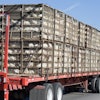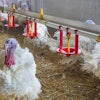A healthy flock is a happy flock. Healthy birds are better able to produce quality eggs, raise a clutch of chicks or roam our backyards. With disease pressures ever present, how can we prevent illness from entering our flocks?
Gordon Ballam, Ph.D.,a poultry nutritionist for Purina Animal Nutrition, encourages flock owners to create a simple disease prevention plan. Ballam divides prevention into two core topics: quality nutrition and sound management.
“The most important aspect of bird health is a partnership of good nutrition and flock management,” he says. “For optimal health and production of your birds, you can’t have one without the other.”
Quality nutrition
Nutrition is just as important to flock health as it is to human health.
“Think of yourself or your kids,” Ballam says. “Nutrition helps keep you both healthy. If we become tired, rundown or don’t eat, we’re more susceptible to catching an illness. It’s the same for chickens. Birds that are not eating a quality diet have higher susceptibility to illness.”
Because nutrition is the basis for health, be sure to feed birds a complete feed from a reputable company. The feed should include essential vitamins, antioxidants and minerals as well as prebiotics and probiotics to support digestive health and support a healthy immune system.
“Be sure to not feed more than a combined total of 10 percent scratch grains, treats and table scraps,” Ballam advises. “If these treats are given in excess, they dilute the critical nutrients of the complete feed.”
Sound management
Management is the second component of a healthy flock.
“Minimizing the transfer of disease through carriers will go a long way to reduce the potential risk of the flock catching a disease or parasite,” Ballam says.
Following are general guidelines for maintaining a sanitary flock and coop from the U.S. Department of Agriculture (USDA):[1]
1. Keep your distance.
- Restrict access to your property and your birds. If visitors have birds of their own, do not let them near your birds.
- Your birds should not have contact with wild birds and migratory waterfowl because they can carry germs and diseases. As an example, make sure there is a roof over your runs.
2. Keep it clean.
- Wash your hands thoroughly before and after working with your birds.
- Wear clean clothes and scrub your shoes with disinfectant before tending your birds.
- Clean and disinfect equipment, including cages and tools that come in contact with your birds or their droppings. Remove manure before disinfecting equipment.
- Properly dispose of dead birds.
3. Don’t haul disease home.
- Buy birds from reputable sources.
- Quarantine new birds - and birds that have been removed from the flock and are being returned to the flock - for at least 30 days. The quarantine area needs to be in a separate building and as far away from your coop as possible. Nothing from the quarantined area should come in contact with your coop and the rest of the flock.
- If your birds have been to a fair or exhibition, keep them separated from your flock for 30 days after the event and follow the quarantine recommendations mentioned.
4. Don’t borrow disease from your neighbors.
- Do not share garden equipment or poultry supplies with your neighbors or other bird owners.
- If you do bring these items home, clean and disinfect them before they reach your property.
5. Know the warning signs.
- Early detection can help prevent the spread of disease. Symptoms of illness may include: decreased feed consumption, huddling, depression, closed eyes, respiratory signs (such as coughing and sneezing), watery greenish diarrhea, excessive thirst or swollen wattles and combs.[2]
6. Report sick birds. Don’t wait.
- If your birds are sick or dying, call your local cooperative extension office, veterinarian, the State Veterinarian or State animal/poultry diagnostic laboratory or the USDA toll free at 1-866-536-7593. The USDA will put you in touch with a local contact that can help you.
“These management tips can help you maintain a sanitary coop and help keep your flock in good health,” says Ballam. “At all times, it’s a combination of quality nutrition and sound management that can help maintain a happy, healthy flock.”
For additional information on bird biosecurity, visit http://1.usa.gov/1v6iEnc.
[1]
“Biosecurity
for Poultry – Keeping your Poultry Healthy.” United
States Department of Agriculture Animal and Plant Health Inspection Service.
[2] “Animal diseases.” Wisconsin Department of Agriculture,
Trade and Consumer Protection.




.jpg?auto=format%2Ccompress&fit=crop&h=167&q=70&w=250)











